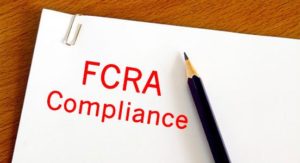- in Uncategorized by Nancy
FCRA: What Employers Need to Know
 While background information such as work history, medical history, education, financial history can be invaluable when making personnel decisions employers must understand the laws they must comply with to protect employees/volunteers and employee candidates from discrimination. The regulations governing the actions of professional background screeners as well as end-users are spelled out in the Fair Credit Reporting Act (FCRA), the Consumer Financial Protection Bureau’s “A Summary of Your Rights Under the Fair Credit Reporting Act” and the “Notice to Users of Consumer Reports: Obligations of Users Under the FCRA.”
While background information such as work history, medical history, education, financial history can be invaluable when making personnel decisions employers must understand the laws they must comply with to protect employees/volunteers and employee candidates from discrimination. The regulations governing the actions of professional background screeners as well as end-users are spelled out in the Fair Credit Reporting Act (FCRA), the Consumer Financial Protection Bureau’s “A Summary of Your Rights Under the Fair Credit Reporting Act” and the “Notice to Users of Consumer Reports: Obligations of Users Under the FCRA.”
The FCRA ensures compliance by employers or organizations that decide not to move forward with an applicant after receiving the report from a background check.
Permissible Purpose
Under the FCRA, a consumer reporting agency (CRA) can only conduct background checks for a “permissible purpose.” This means that the person has to be someone who will be potentially employed by or volunteer with the organization.
Disclosure and Authorization
Before obtaining a consumer report, the organization must first obtain written consent from the applicant. This notice to the applicant is known as the disclosure form.
In addition to the disclosure form, the applicant must receive and sign the authorization form that permits the employer to run the background check.
The disclosure and authorization forms must be stand-alone documents that are separate from the application. It is important that the authorization form is not buried within the application to ensure it is clear to the applicant that a background check will be run on them.
Pre-Adverse Action
After receiving the consumer report, if an organization decides not to move forward with the applicant based on the background check results, the organization is required to provide the applicant with a pre-adverse action notice. The purpose of this letter is to provide the applicant with a copy of the consumer report and a description in writing of the rights of the consumer. The pre-adverse action process must also be followed if a current employee is rescreened and fired or not promoted due to the results.
Applicants who are denied employment based in whole or in part on their background check are entitled to a free background screening report from the named agency within 60 days of their employment being denied or terminated. Employers and organizations must allow “reasonable time” to the applicant to respond, which is often five business days but can be shorter or longer as long as it is reasonable.
Adverse Action
Once “reasonable time” has been provided, a second document, known as the adverse action notice, is required to be sent. The pre-adverse action notice and the adverse action notice cannot be sent in the same document. The adverse action notice must include the name, address, and phone number of the CRA, explain how to obtain a free copy of the report, and include information to let the applicant know they have the right to dispute any information contained in their report.
Failing to comply with the FRCA can result in a civil action in federal court against the employer or organization. Please contact us with questions about background check compliance and to help simplify FCRA compliance.
